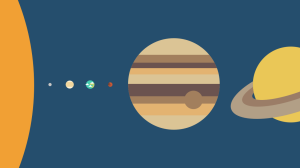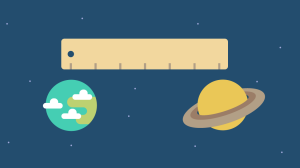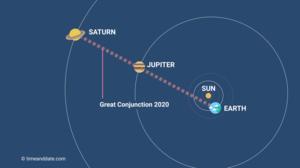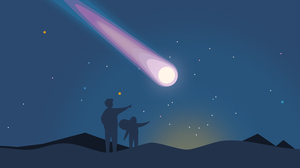10 hours, 40 minutes
Tue, Apr 23 at 6:41 pm – Wed, Apr 24 at 5:21 am
Visible tonight, Apr 23 – Apr 24, 2024
| Mercury: | From Wed 4:37 am |
|---|---|
| Venus: | From Wed 4:57 am |
| Mars: | From Wed 3:43 am |
| Jupiter: | Until Tue 8:09 pm |
| Saturn: | From Wed 3:22 am |
| Uranus: | Until Tue 8:08 pm |
| Neptune: | From Wed 3:53 am |
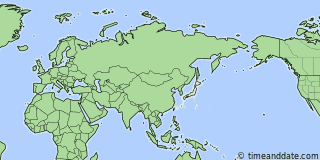
April 21–22: Peak of Lyrid Meteor Shower
This year, the Lyrids peak around the time of a bright Full Moon—never ideal for seeing shooting stars. Check viewing conditions for your city.
Our Interactive Night Sky Map simulates the sky above 34°21'22.2"N, 134°02'54.0"E. The Moon and planets have been enlarged slightly for clarity. On mobile devices, tap to steer the map by pointing your device at the sky. Need some help?
Tonight's Sky in 34°21'22.2"N, 134°02'54.0"E, Apr 23 – Apr 24, 2024 (7 planets visible)
Mercury rise and set in 34°21'22.2"N, 134°02'54.0"E
Fairly close to the Sun. Visible only before sunrise and/or after sunset.
Mercury is just 17 degrees from the Sun in the sky, so it is difficult to see.
Wed, Apr 24 ↑4:37 am
Time:
Altitude: °
Direction: °
Venus rise and set in 34°21'22.2"N, 134°02'54.0"E
Fairly close to the Sun. Visible only before sunrise and/or after sunset.
Venus is just 11 degrees from the Sun in the sky, so it is difficult to see. Venus is visible by day, but may be hard to find.
Wed, Apr 24 ↑4:57 am
Time:
Altitude: °
Direction: °
Mars rise and set in 34°21'22.2"N, 134°02'54.0"E
View before sunrise.
Mars can best be seen in the hours just before sunrise. Visibility deteriorates as the sky gets brighter.
Wed, Apr 24 ↑3:43 am
Time:
Altitude: °
Direction: °
Jupiter rise and set in 34°21'22.2"N, 134°02'54.0"E
View just after sunset.
Jupiter is close to the Sun and can only be seen shortly after sunset. Try finding a good, unobstructed view of the horizon.
Tue, Apr 23 ↓8:09 pm
Time:
Altitude: °
Direction: °
Saturn rise and set in 34°21'22.2"N, 134°02'54.0"E
View before sunrise.
Saturn can best be seen in the hours just before sunrise. Visibility deteriorates as the sky gets brighter.
Wed, Apr 24 ↑3:22 am
Time:
Altitude: °
Direction: °
Uranus rise and set in 34°21'22.2"N, 134°02'54.0"E
Very close to Sun, hard or impossible to see.
Uranus is just 18 degrees from the Sun in the sky, so it is difficult or impossible to see it.
Tue, Apr 23 ↓8:08 pm
Time:
Altitude: °
Direction: °
Neptune rise and set in 34°21'22.2"N, 134°02'54.0"E
Fairly close to the Sun. Visible only before sunrise and/or after sunset. Bring binoculars (but don't look at the Sun!).
Neptune is just 35 degrees from the Sun in the sky, so it is difficult to see. You may need binoculars, but only use them when sun is down.
Wed, Apr 24 ↑3:53 am
Time:
Altitude: °
Direction: °
Planets Visible in 34°21'22.2"N, 134°02'54.0"E
| Planetrise/Planetset, Tue, Apr 23, 2024 | ||||
|---|---|---|---|---|
| Planet | Rise | Set | Meridian | Comment |
| Mercury | Wed 4:37 am | Wed 5:10 pm | Wed 10:54 am | Very difficult to see |
| Venus | Wed 4:57 am | Wed 5:46 pm | Wed 11:21 am | Slightly difficult to see |
| Mars | Wed 3:43 am | Wed 3:30 pm | Wed 9:36 am | Average visibility |
| Jupiter | Tue 6:25 am | Tue 8:09 pm | Tue 1:17 pm | Average visibility |
| Saturn | Wed 3:22 am | Wed 2:47 pm | Wed 9:04 am | Average visibility |
| Uranus | Tue 6:22 am | Tue 8:08 pm | Tue 1:15 pm | Extremely difficult to see |
| Neptune | Wed 3:53 am | Wed 3:48 pm | Wed 9:50 am | Extremely difficult to see |







